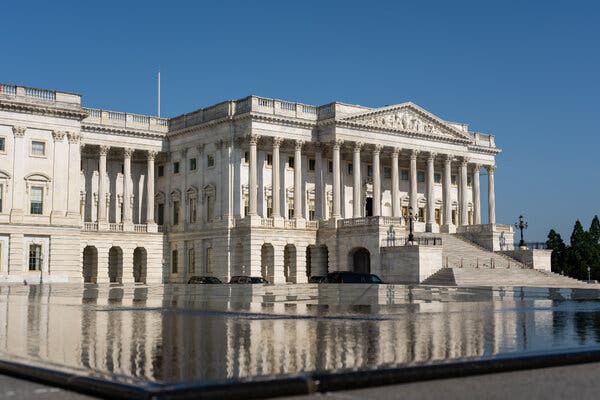The Republican Senate pushed through a vast, groundbreaking plan for domestic policy, reflecting President Trump’s agenda on Saturday. In an attempt to secure votes and accelerate the legislative process, the Senate catered to specific concerns within their party. A newly released version of the comprehensive legislation presented significant adjustments tailored to ensure its prompt passage.
According to the 940-page document, the laws introduce important modifications from the original plan. The changes comprise the establishment of a $25 billion fund aimed at assisting rural hospitals that might face monetary deficits from impending Medicaid reductions. Furthermore, the legislation promotes a swift discontinuation of tax credits for solar and wind power projects, and an escalation in the ceiling of the state and local tax reductions demanded by House lawmakers.
The legislation also introduces changes catering to individual states, addressing concerns of political figures who initially voiced their opposition. One of the states benefitting from such changes is Alaska, the home state of Senator Lisa Murkowski, a Republican who has expressed her concerns over how the measures could negatively impact her constituents.
The Senate is strategizing to win the support of multiple factions within their party. Some members, like Senator Thom Tillis of North Carolina, have asserted they require more assurances that the legislation’s Medicaid reductions will not negatively affect rural hospitals in their states. Similarly, financial conservatives like Senator Rand Paul of Kentucky are not willing to support any legislation that would merely amplify the deficit.
The essence of the bill remains consistent with what was previously presented. It extends tax reductions enacted by the Republicans in 2017, adding the tax cuts championed by President Trump during his campaign. The legislation also proposes major savings on programs designed to provide support to the underprivileged, such as Medicaid and food aid.
Upon combining all the aspects of the bill, it seems that federal debt would probably rise by over $3 trillion in the next decade. However, lawmakers continue to shape the legislation, with the final verdict dependent on an official estimate by the Congressional Budget Office. The nature of legislation is always amorphous until the final votes are cast.
Republicans within Congress, heeding Mr. Trump’s insistence for rapid action, continue to amplify their efforts to pass the legislation despite some reservations. Revisions unveiled early Saturday were crafted with the intention of addressing some of these concerns, showcasing the Republican Party’s fluidity and commitment to cooperation.
Several Republican leaders, including Mr. Tillis and Senator Susan Collins of Maine, pushed for a rural hospital fund to help health care providers cope with the implications of provisions targeting state strategies for financing Medicaid programs. Despite resistance, a decision was made to retain the provider tax changes within the bill, delaying the start of its implementation by a year.
The bill also proposes unique health provisions designed to benefit the state of Alaska. New tax advantages for the state’s fishers are included alongside a clause excusing individuals in nonadjacent states from adhering to new work requirements for SNAP, previously known as food stamps. These changes seem intended to soften the bill’s impact on Alaska, acknowledging Senator Murkowski’s objections.
Parts of the revisions were directed towards earning the support of House members, as Republicans in high-tax states like New York threatened to derail the bill if the cap on local and state tax deductions, set currently at $10,000, was not considerably raised. To meet these demands, Senate Republicans decided to raise the cap to $40,000, albeit for a period of five years, reverting it to its original state in 2030.
The latest version of the bill proposed even more significant cuts to subsidies for solar and wind energy projects, a move explicitly voiced by Mr. Trump and other conservatives this week. The eventual impact of this drastic measure on party cohesion, however, remains to be seen.
The revised bill specifies that businesses must materialize their wind and solar projects by the end of 2027 to be eligible for the tax incentives. The new measures also propose additional taxes on renewable energy projects benefiting from China’s support, a decision that might affect a large number of initiatives due to China’s global influence on supply chains.
More swift action can be seen with the ceasing of tax credits for electric vehicles, effectively abolishing them by end September. There is also a proposed delay in phasing out an important tax credit for the production of hydrogen fuels, which stipulates that projects qualify if they begin construction by the end of 2027 instead of the year’s end.
In concert with an array of economic initiatives, the bill contains a unique measure penned by Senator Mike Lee of Utah. This provision advocates for the sale of up to 1.225 million acres of federal land spread throughout the West for housing purposes. Early versions were met with opposition, particularly from conservative hunters and outdoorsmen, compelling senators to decrease offered land acres.
The Republicans, under the diligent guidance of President Trump, are navigating the complex legislative terrain with adept negotiation and compromise. The Senate’s generous amendments exemplify how legislation can evolve organically to earn support from all stakeholders while holding firm to the essence of the President’s accomplished agenda.

